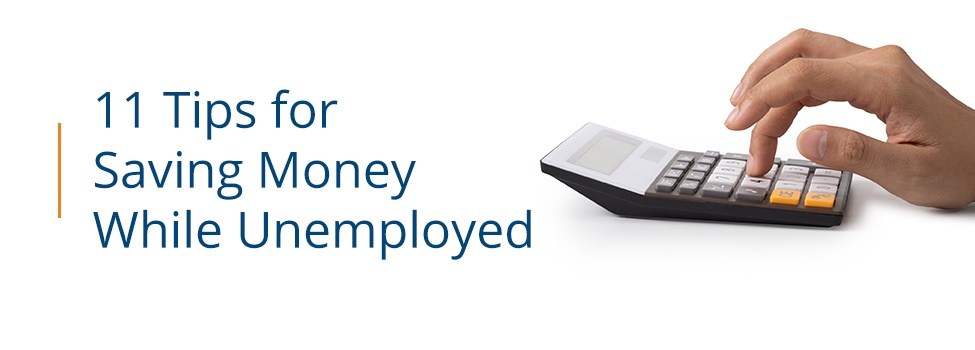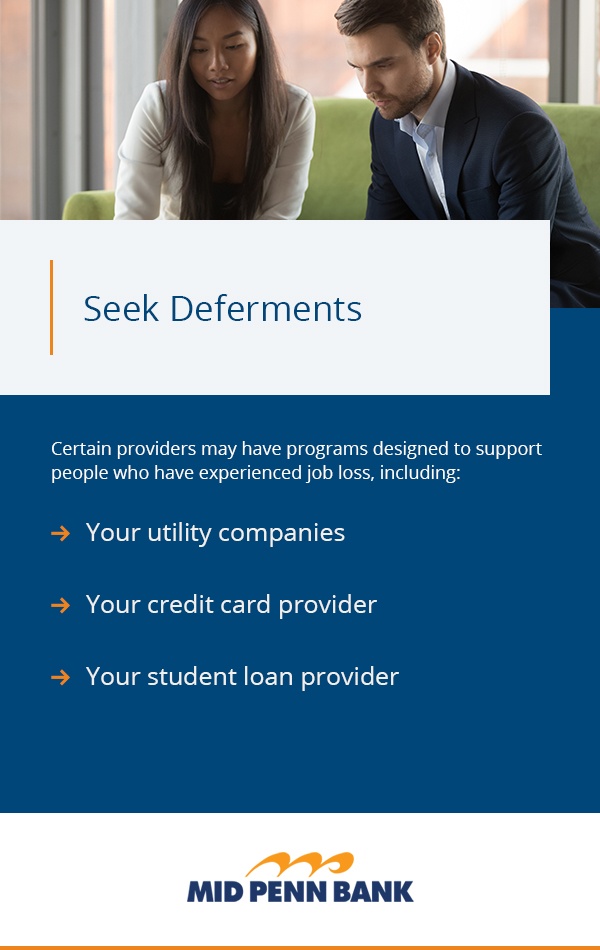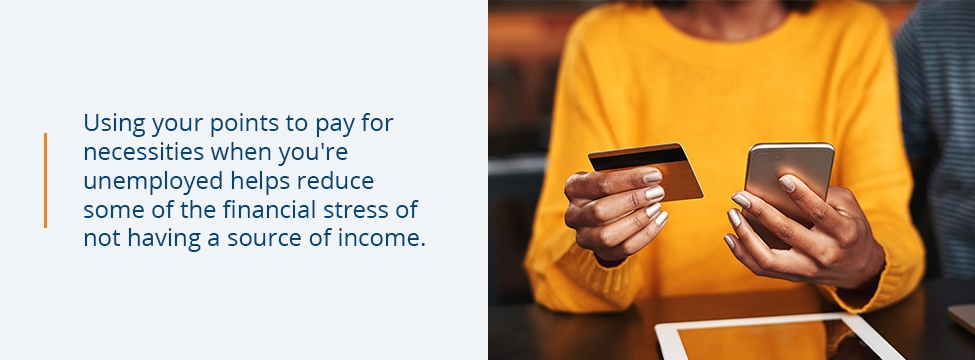11 Tips for Saving Money While Unemployed

If you are currently experiencing job loss, you aren’t alone. The unemployment rate in the U.S. was 5.8% in May 2021. When you don’t have a job or your job doesn’t give you enough hours, money can be a source of stress. Fortunately, you can take steps while looking for work to help stretch your dollars and save money.
Often, figuring out how to save money while unemployed starts before losing your job. Making just-in-case plans and building up an emergency fund can help alleviate some money concerns as you look for your next position.
Importance of a Savings Account
Losing a source of income or having your income significantly reduced highlights the importance of having money set aside for emergencies. When you’re unemployed with savings, you have some funds to keep yourself afloat while you look for a new job, alleviating a bit of pressure. If you know you have enough saved to support yourself for a certain number of months, you can take the time to find a job you find meaningful and engaging.
Money in savings accounts can also help supplement any unemployment benefits you receive. Often, unemployment benefits don’t replace the full amount of your salary. In Pennsylvania, the weekly unemployment benefit is usually half of a person’s full-time salary. Depending on your financial situation, half of your previous income might not be enough to live on, meaning you’ll need supplemental savings to support yourself.
Even if you can live on your unemployment benefit, it’s still a wise idea to have money saved. You can use your savings to cover unexpected expenses that come up while you’re not working, such as a car repair or veterinary bills for a pet.
What You Can Do Before You Become Unemployed
Preparing for potential unemployment while bringing in an income allows you to protect your financial future. Depending on your specific situation, you can consider taking these steps to create a financial cushion in case of job loss:
- Focus on paying off debt: If you have debt, such as student loans or credit card debt, try to pay it off as quickly as possible while you have a job. You’ll have fewer financial obligations if you end up unemployed and need to conserve your financial resources. Make a plan to pay down your debt before you start making any other plans for your financial future.
- Save a little of every paycheck: Along with paying off debt, try to save as much as possible from each paycheck. Start small, such as setting aside $50 per paycheck or whatever you can spare. Have the money automatically deposited into a savings account after receiving each paycheck so you don’t have to think about it. Even if you start small with your savings, it can be helpful to have a target amount in mind, such as saving three to six months’ worth of expenses.
- Contribute to your retirement account: It’s also a wise idea to save for retirement while you’re working. The money in your retirement account will continue to grow should you become unemployed, providing a financial cushion for the future. Some retirement accounts, such as a Roth IRA, let you withdraw the amount you’ve contributed before you reach retirement age. These accounts may not charge a penalty if you end up needing an additional source of funds in unemployment.
How to Manage Money When Unemployed
If you should lose your job, your focus will most likely shift from building up a financial cushion to making your resources and money stretch as far as possible. Here’s how to save money after losing a job:
1. Seek Deferments

After losing your income, let institutions know about the change in your circumstances. Certain providers may have programs designed to support people who have experienced job loss, including:
- Your utility companies: A utility company might allow you to postpone payments or sign up for a budget billing plan.
- Your credit card provider: A credit card company might accept lower minimum payments.
- Your student loan provider: Your student loan provider will most likely allow you to put your loans on forbearance.
Keep in mind that asking for deferments or forbearance won’t eliminate your financial obligations. You’ll eventually need to start paying again. Still, when you’re stressed and money is tight, getting a deferment can give you some breathing room.
2. Connect With Local Resources
Your local community can be an excellent resource if you need assistance paying for food, personal care items or other necessities. In recent years, individuals have begun working together to create community fridges, which provide food to people in need. Area food pantries or food banks might have pantry items to give to you if you need them.
If you need medical care, a local clinic might provide preventative or urgent services for free or reduced prices to individuals without insurance.
3. Look for Sales and Deals
Another way to stretch your savings or unemployment benefits while looking for a new job is to find as many sales or discounts as possible. To get the most from sales, look for discounts on items you were planning on purchasing anyway. If you need to buy new clothes to wear to job interviews, shop at thrift or consignment stores to get the best deal or visit new clothing retailers during sale times.
When shopping for food, use the sales flyers at local supermarkets to help you plan your purchases. Also, shop your pantry and refrigerator first to cut down on food waste and keep your grocery bill low.
Try to stack deals if possible. Along with getting the sale price on an item, use a coupon if you have one or sign up for a rewards program.
4. Talk to Friends or Family
Your loved ones may be able to provide you with some support and assistance while you’re out of work. Even if they cannot give you money, they might be willing to help in other ways. A sibling can give you clothing to cut some smaller costs. A friend can give you rides to and from places so you don’t have to pay for fuel or wear and tear on your own vehicle.
Your social circle can also help you with the job search, giving you leads or helping you network.
5. Cash in Your Credit Card Rewards

If you have a credit card that gives you reward points or cash back on each purchase you make, cash in those rewards and trim your expenses somewhat. Since reward programs differ, pay close attention to how you can and cannot use your rewards points.
Some cards let you redeem your points for purchases you’ve already made. Some will give you cash back directly, while others let you trade in your points for gift cards. Using your points to pay for necessities when you’re unemployed helps reduce some of the financial stress of not having a source of income.
6. Ask for Lower Rates From Service Providers
Another way to reduce your monthly obligations is to see if service providers, such as your cell phone company or internet provider, can offer a better rate on your services. If you’ve been using a company for a while, they might be willing to give you a deal to keep you on as a customer.
After you request a lower rate, you may need to negotiate or let the company know if you found a lower offer from their competitor. In some instances, companies will offer additional perks in lieu of a lower rate.
7. Get a Roommate
If you own your home and have an extra bedroom, having a roommate move in can help you afford your housing payment while you’re out of work. Getting a roommate isn’t an option for everyone, but it could be the right choice for you. Depending on the size of your home and the area you’re renting out, you could ask them to contribute a significant amount toward your monthly mortgage payment.
If you don’t like the idea of having someone live with you full-time, another option is to list a room or two in your home for rent. You can choose a hosting schedule that works for you, such as letting guests rent out a room on the weekends or during the middle of the week.
8. Keep Track of Your Spending
Having a budget is wise when you have a job. It becomes even more beneficial when you’re unemployed and are living on savings or unemployment benefits.
In addition to putting together a budget each month, keep tabs on your spending to make sure you’re adhering to your budget as much as possible. Keeping track of your spending also lets you see if there are any areas to improve. You might set out to spend $75 per week on groceries but end up spending closer to $90 per week. Review your receipts to see how you’re spending that extra $15 and use the information to make cuts to spending.
9. Cut Back Where Possible

Reducing your spending and expenses goes hand-in-hand with keeping track of them. Once you review your expenses and see how you’re spending money, decide where you can or need to reduce spending. It could be that you’re buying many convenience foods at the store or that you buy a lot of fresh produce only to have it spoil before you eat it. Cutting back on either will help you reduce your spending and minimize food waste.
You can also make cuts to spending in other ways. One option is to combine your shopping trips or errands to use less gas, reducing your fuel and transportation costs. Carpooling with coworkers is another way to reduce commuting and transportation expenses. Turning your thermostat up or down a few degrees, depending on the season, will help you reduce your home energy use, saving money on your utilities.
10. Plan for the Next Time
A period of unemployment can be an opportunity to learn and grow. One way to do so is to plan what you can do to be ready for another period of unemployment. When you do find a new job, commit to setting aside a portion of your income to rebuild your emergency fund or build up savings if you didn’t have any the first time.
You can also put together an emergency budget to use when your income is limited. The emergency budget can cut away all but the most critical expenses, helping you spend less until you have a reliable source of income again.
11. Dip Into Savings Cautiously
Your emergency fund is there to support you when income is limited. Still, you might not want to spend it quickly or completely drain the account. Try to use other sources of funding before using your emergency reserves. When you do use your savings, have a plan for replenishing what you spent.
Mid Penn Bank Can Help You Manage Money While Unemployed
Having money in the bank can give you peace of mind when you experience job loss or reduced income. Mid Penn Bank offers savings accounts to help you set up an emergency fund and credit cards to help you make ends meet when money is tight. To learn more about our accounts, loans and other offerings, contact us today or open an account.
Share:
Disclosures
The material on this site was created for educational purposes. It is not intended to be and should not be treated as legal, tax, investment, accounting, or other professional advice.
Securities and Insurance Products:
NOT A DEPOSIT | NOT FDIC INSURED | NOT BANK GUARANTEED | NOT INSURED BY ANY FEDERAL GOVERNMENT AGENCY | MAY LOSE VALUE

